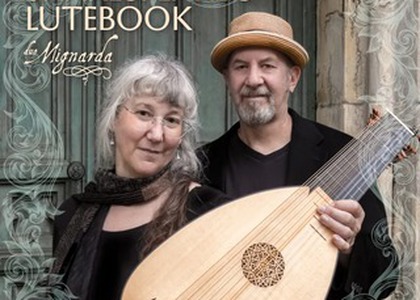Disk of 2024

The Mignarda Duo – “Shakespeare’s Lutebook” – CD Review, 13th of May 2024
Well-known to the US audience who enjoys old music, the Mignarda Duo continues its odyssey of more than 20 years, launching a new album that completes a rich discography on a repertoire based on voice, the Renaissance lute and also on Gregorian music - a new album entitled "Shakespeare's Lutebook". It will be out on the 4th of March, under the label of Prima Classic, putting together music from the plays of the famous English playwright. From the album's commentaries, we learn that what we are listening to is the outcome of decades of research, recitals and conferences across the US. The album is also complemented by a collection of scores published under the same title. And, according to the research, music played an essential role in Shakespeare's plays. Moreover, this is not the only album in the field, but its expressivity, inner warmth and accessibility are the particularities that make it unique.
This is mainly because of Donna Steward's mezzo-soprano vocal timbre, a natural one, with no voice training required by the preparation for opera stage evolution, but with a magnificent beauty, her voice is accompanied by the sound of the lute - I am talking about Ron Andrico, a musician who has been in the world of theatre and American concerts for more than 30 years. He was also involved in research, having edited and published numerous collections dedicated to this instrument. Their story is very beautiful, but I will reveal it to you after listening to a few songs on "Shakespeare's Lutebook" - most of them anonymous.
Donna Steward and Ron Andrico met in Cleveland Ohio in the early 200s, at a Gregorian and Renaissance music class. Their first concert was held in the fall of 2003. After that, they drew back in a cabin in the Siskiyou Mountains to study the 16th century music, occasionally seeking guidance from specialized artists, such as Nigel North, Hopkins Smith and Anthony Rooley. Then came tours and relocation, first in the woods of the state of New York, then in Cleveland Heights, Ohio, always travelling and sharing their passion for this ancient music with the American public. 20 years have passed, as they accumulated a huge experiencewhich is to be found in a discography admired by critics and people interested in this subject, often covering an area between traditional and cult music, which could be assimilated with today's pop music. This nuanced rendering of sensibility, warm tone and a very solid documentation of Shakespeare's world is predominant.
With the help of the Mignarda Duo's album, we discover musical pages in a less elaborate manner, compared to the cult music phenomenon, but not lacking nuances and expressive subtilities. The duo's members say that their approach follows a good understanding of the text, choosing the original musical fragments, or using the historically informed style and conventions of the time when the original sources are missing. We are assured that musicians and actors were included in Shakespeare's plays, because at the Globe Theatre (outdoors) much more powerful instruments were used, but when it came to the representations at Blackfriars Theatre, the lute was always included in the cast because of its intimate character and the way it was able to accompany the human voice. Each song is accompanied in the album's presentation by further details regarding the dramatic text and its origins, and there are also details about the manuscripts preserving this music. Since time does not allow such detailing, we are going to listen to a few of the most representative pieces, enchanted by the charm of music, by the simplicity and the naturalness of the Mignarda Duo, which aims to show the audience of the 21st century the musical world of Shakespeare in the most accurate and natural way.
A few memorable titles are: The willow song fromShakespeare's Othello, When Griping Griefs from Romeo and Juliette, both of them anonymous, My mind to me a kingdom isby William Byrd, O mistress minefrom the play entitled Twelfth Night, Sleepe slumbring eyesby Thomas Morley, an author who often collaborated with the English playwright, the well-known ballad Greensleaves, used at that time in The Merry Wives of Windsor, As I Walked Forth, by Robert Johnson, one of the composers who wrote music for Blackfriars Theatre in London during Shakespeare's time.














